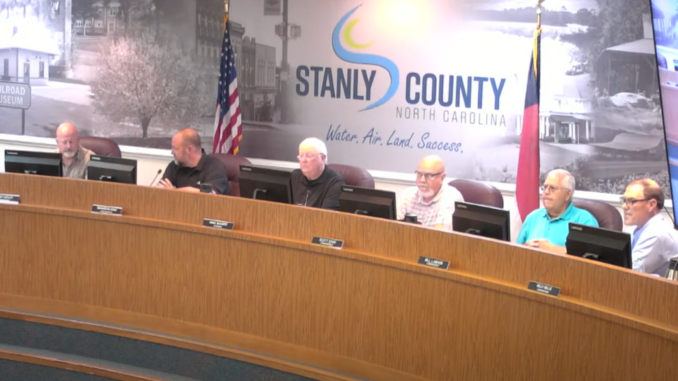
ALBEMARLE — At the Stanly County Board of Commissioners meeting on Monday, an environmental group presented an update on its Badin Lake restoration project.
Representatives from Restore Badin Lake, a 501c3 nonprofit made up of volunteers advocating for Badin Lake revitalization, spoke to the commissioners about their plan to remove black mat algae from the lake.
David Holton, president of RBL, told the commissioners on Monday that Cube Hydro and the North Carolina Department of Environmental Quality paid for a pilot test on Badin Lake that was initiated during the past three years.
While the nonprofit also presented algaecide alternatives and newer technologies to the NCDEQ, those methods were tabled due to a lack of peer review studies and longevity.
This left RBL unsure of what direction to go next — up until recently.
“Two weeks ago, NC State announced that the project they’ve been working on at Lake Gaston has completed, and they’ve been doing about 300 acres up there,” Holton said. “They feel like they have the right formula for applying this algaecide and the right mixture. They’re saying that six treatments per year for four years in a dedicated area will remove the algae.”
Holton clarified that the long-term effectiveness of the Captain XTR + AMP chemical formula used at Lake Gaston is still to be determined.
“It hasn’t come back yet, but that’s not to say it won’t come back in five or six years. There may be some spot treatment, but right now, they’re satisfied that this is cleaning out the area. They announced they were expanding statewide.”
He noted that along with securing a provider for the service, Cube Hydro has given him a verbal agreement to facilitate the plan for Badin Lake and that he is now waiting for an approval license to arrive “any day now.”
The first phase of the plan is to treat up to 11 acres of water surface area starting this spring, with six annual treatments deployed from April to September for the next two to four years.
NC State University’s Aqua Plant Management Program determined that the Captain XTR + AMP formula is safe for all aquatic life, people and pets.
RBL is now planning to host informational meetings at the Heron Bay and Uwharrie Point residential communities to let residents know how money will be raised for the project through a grassroots community effort.
Because of time constraints of introducing the initiative to the local area, RBL expects local lake residents to likely carry most of the financial burden for the first year of treatment; donations can be sent to RBL’s mailing address (301 Millingport Lane, New London, NC, 28127) or dropped off at the Guardhouse at Uwharrie Point.
The nonprofit is hoping that Stanly County could contribute financially to the restoration project in the form of a grant or government money while it awaits a possible state funding package sometime in the future.
“One of the things we wanted to do tonight was just to come and specifically ask that you consider a donation to this,” Holton said to the commissioners. “We are here to help make the lake a better place. We are asking in our letter for a $10,000 or more donation to our 501c3 so we can help restore this lake the way to where it needs to be.”
That request was not specifically addressed by the board following the presentation.
The Stanly County Board of Commissioners is set to hold its next regular meeting on May 12 at 6 p.m. inside the Gene McIntyre Meeting Room at Stanly County Commons.
